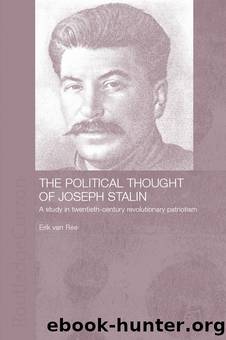The Political Thought of Joseph Stalin by Ree Erik van

Author:Ree, Erik van.
Language: eng
Format: epub
ISBN: 978-1-135-78604-5
Publisher: Taylor & Francis (CAM)
14 Socialist in content, national in form
At the time when he was People’s Commissar of Nationalities under Lenin, Stalin treated the Great Russians as the most modern, leading nation of the empire. As a historic nation, they overcame “feudal fragmentation” most successfully. The Russians had first drawn their territories together and formed a centralised state.1 Economic unification further provided Russia proper with a relatively advanced industrialisation and urbanisation. And, last but not least, in Russia the “medieval” fragmentation of people into separate cultural-linguistic communities was overcome more fully than elsewhere. It was nationally the most homogeneous territory. However, the commissar understood that one could not force non-Russian nations to subject themselves to assimilation into Russian modernity. They should be allowed a degree of cultural and administrative autonomy.
Two stages can be distinguished in Stalin’s nationality policies. Until the mid-1930s, the autonomy of the non-Russian nations was respected to a significant degree. The policy was called “nationalisation” or “indigenisation” (korenizatsiia). Local cadres were expected to dominate the local government and party apparatus, and the press and schools should operate mainly in local languages. Subsequently, the Russian stamp on the republics became heavier, although Stalin never turned to complete Russification. From a Marxist perspective, the first stage was dominated by the insight, derived from the Austro-Marxists, of the tenacity of national cultural identities. During the second, the old approach, originally connected with Engels, of leaning on the leading historic nation reasserted itself, although Russian culture was now treated not only in terms of abstract modernity but as specifically Russian culture with an identity of its own.
Lenin had not left behind a simple formula to capture nationality policy. In May 1925, the new leader provided it in a speech to students of the Communist University of Toilers of the East about the policy of cultural autonomy for the non-Russian republics:
But what is national culture? How can we combine it with proletarian culture? Didn’t Lenin say…that the slogan of national culture is a reactionary slogan of the bourgeoisie…? …proletarian culture, socialist by its content, assumes different forms and ways of expression among different peoples…, dependent on the difference of language, way of life etc. Proletarian in content, national in form – such is the universal [obshchechelovecheskaia] culture to which socialism strives. Proletarian culture does not abolish national culture, but provides it with its content.
Download
This site does not store any files on its server. We only index and link to content provided by other sites. Please contact the content providers to delete copyright contents if any and email us, we'll remove relevant links or contents immediately.
| Anarchism | Communism & Socialism |
| Conservatism & Liberalism | Democracy |
| Fascism | Libertarianism |
| Nationalism | Radicalism |
| Utopian |
The Secret History by Donna Tartt(16623)
The Social Justice Warrior Handbook by Lisa De Pasquale(11489)
Thirteen Reasons Why by Jay Asher(7788)
This Is How You Lose Her by Junot Diaz(5772)
Weapons of Math Destruction by Cathy O'Neil(5037)
Zero to One by Peter Thiel(4824)
The Myth of the Strong Leader by Archie Brown(4789)
Promise Me, Dad by Joe Biden(4447)
Beartown by Fredrik Backman(4419)
Stone's Rules by Roger Stone(4415)
How Democracies Die by Steven Levitsky & Daniel Ziblatt(4399)
The Fire Next Time by James Baldwin(4343)
100 Deadly Skills by Clint Emerson(4078)
A Higher Loyalty: Truth, Lies, and Leadership by James Comey(4033)
Rise and Kill First by Ronen Bergman(4012)
The David Icke Guide to the Global Conspiracy (and how to end it) by David Icke(3882)
The Farm by Tom Rob Smith(3872)
Secrecy World by Jake Bernstein(3782)
The Doomsday Machine by Daniel Ellsberg(3731)
